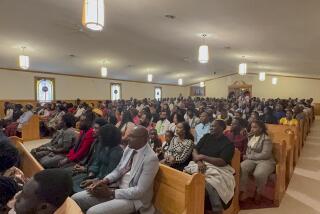CRISIS IN THE CARIBBEAN : Miami’s Haitians Speaking of Bewilderment, Betrayal : Expatriates: Some feel Cedras will renege on his promises again. Others fear extended occupation.
- Share via
MIAMI — The Little Haiti neighborhood here seemed haunted by history Monday, the people riven with mistrust.
In barber shops and offices, exiles watched live satellite broadcasts of American troops pouring into their homeland and even people two generations too young for firsthand knowledge of the event recalled the last U.S. occupation of Haiti as if they had been there for each of its 19 years. “I know what happened in 1915,” said Miguel Jean, 33, a security guard. “They came and then didn’t leave.”
In the restaurant Chez Moy, the staff listened to President Clinton’s televised explanation from the White House of the U.S. deal with Haitian junta leader Lt. Gen. Raoul Cedras. The staff talked back to the television screen.
“There’s the problem!” interjected manager Johnny Origene as the President said Cedras and the other coup leaders would be gone by Oct. 15. “Cedras has said that before.”
Throughout this inner-city neighborhood, home to about 70,000 Haitians--one of the largest Haitian communities in the United States--themes of betrayal and bewilderment were sounded often and loudly on the first day of the second American occupation of Haiti this century. (The first occupation ended in 1934.)
“There were two things the Haitian people wanted: Cedras out and (exiled President Jean-Bertrand) Aristide in. And we have neither one,” said travel agent Carole Thebaud. “So this accord is a little fishy.”
Late Sunday, just after the news of the agreement became known, about 75 people took their protest into Northeast 54th Street, the main artery through Miami’s Little Haiti, blocking traffic. Community activist Samedi Florvil was one of those leading the anti-Cedras chant: “Leave now! Leave now!”
On Monday morning, Florvil sat calmly in the offices of Veye Yo , a local political group that supports Aristide, watching history unfold. “More lies,” he muttered as U.S. officials spoke in a Washington news conference.
But while the streets were tranquil Monday, the anger remained. A small crowd gathered around a man holding up a poster collage of gruesome photographs of bullet-riddled bodies and faces hacked open with machetes. Beneath all was a picture of Cedras and the words: “May the blood ooze into you and your goons.”
“People are kind of upset,” said Father Tom Wenski, a priest at Notre Dame d’Haiti Roman Catholic Church. “They are waiting to see what happens. They are cynical. And when they hear (former President Jimmy) Carter say the U.S. military is going in as partners with the Haitian military, that sends the wrong signal.”
Despite a widespread feeling of relief that no blood had been shed in Haiti, many here expressed incredulity over the power-sharing arrangement that leaves Cedras in place--at least for a time.
Roger Biamby, director of the Pierre Toussaint Catholic Center, called the agreement “a disgrace, a severe blow to democracy and the Haitian people.”
Jean Beltrau, 54, broadcasting his opinion at curbside, declared: “Nobody can trust Cedras! See what happened after Governors Island.”
Indeed, to many Haitians in Miami, where support for Aristide remains strong, the treaty signed by Cedras in July, 1993, at Governors Island in New York Harbor stands as proof of his treachery. Aristide was to return to Haiti last October, after Cedras resigned. But Cedras reneged on his pledge, setting the stage for an American-led intervention.
Some here support the agreement and accept the American occupation as the lesser of evils. “At least this prevented an invasion where blood would have been spilled,” said grocer Lionel Cayard, 37. “It’s a solution for right now, and we’ll have to deal with it.”
And almost everyone hopes that a stabilization of the country will mean a quick end to the economic embargo, especially the recent provisions that prevent large cash transfers and led to a halt of air traffic between Haiti and the United States.
Cayard said his grocery trade has dropped by as much as 25% since flights ended. Travelers to Haiti regularly carried boxes of toothpaste, soap, food and other hard-to-get items to Port-au-Prince, while on return flights he received Haitian peppers, fresh thyme, favored bouillon cubes.
And Thebaud, the travel agent, said she was days from closing her doors.
“We lost 80% of our business when we couldn’t book flights to Haiti,” she said.
More to Read
Sign up for Essential California
The most important California stories and recommendations in your inbox every morning.
You may occasionally receive promotional content from the Los Angeles Times.










